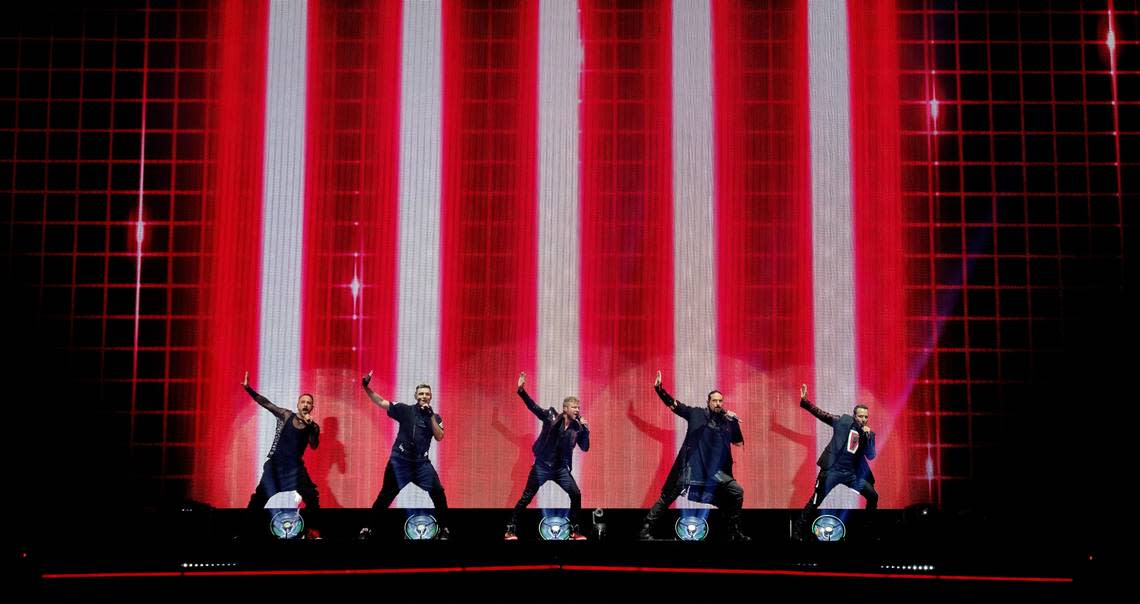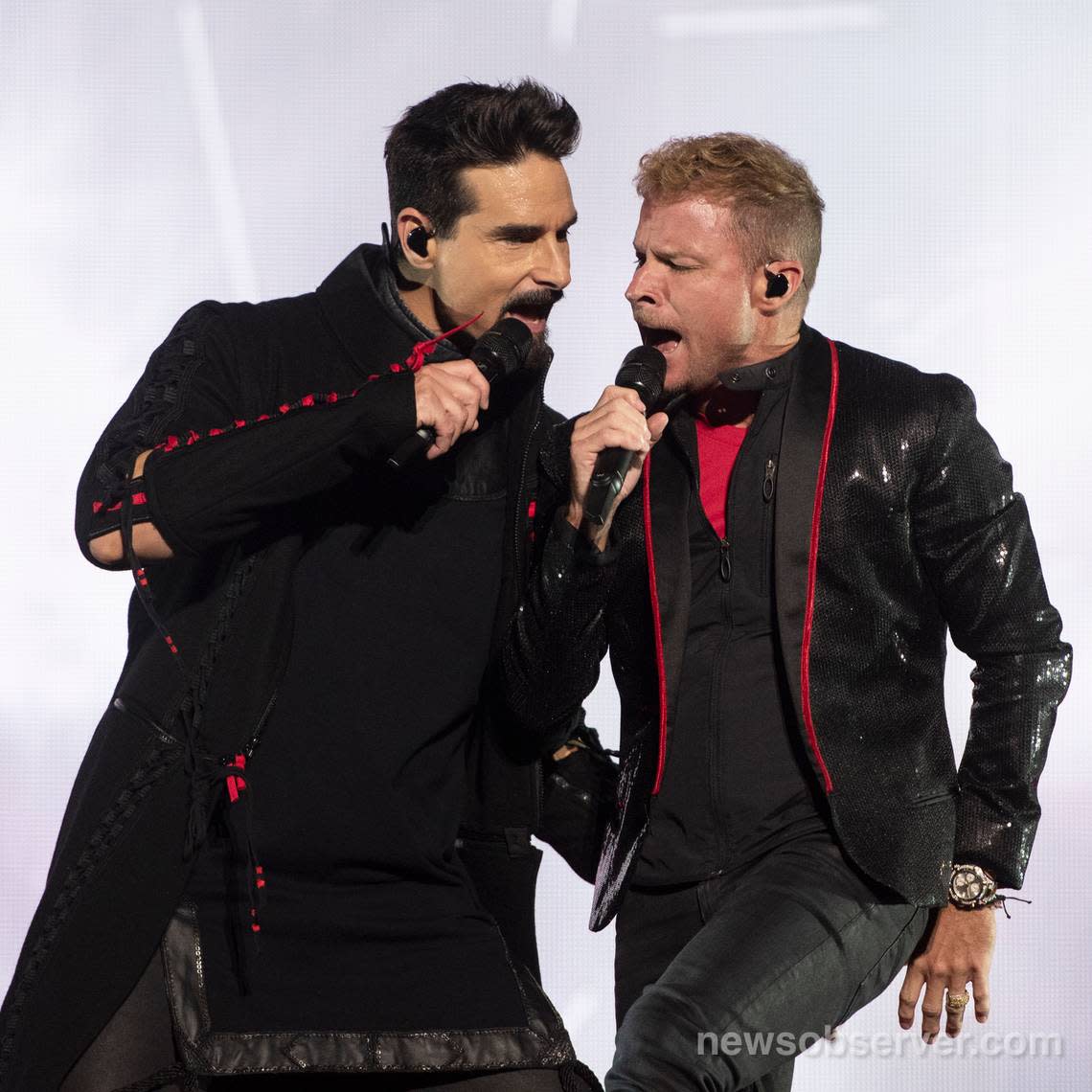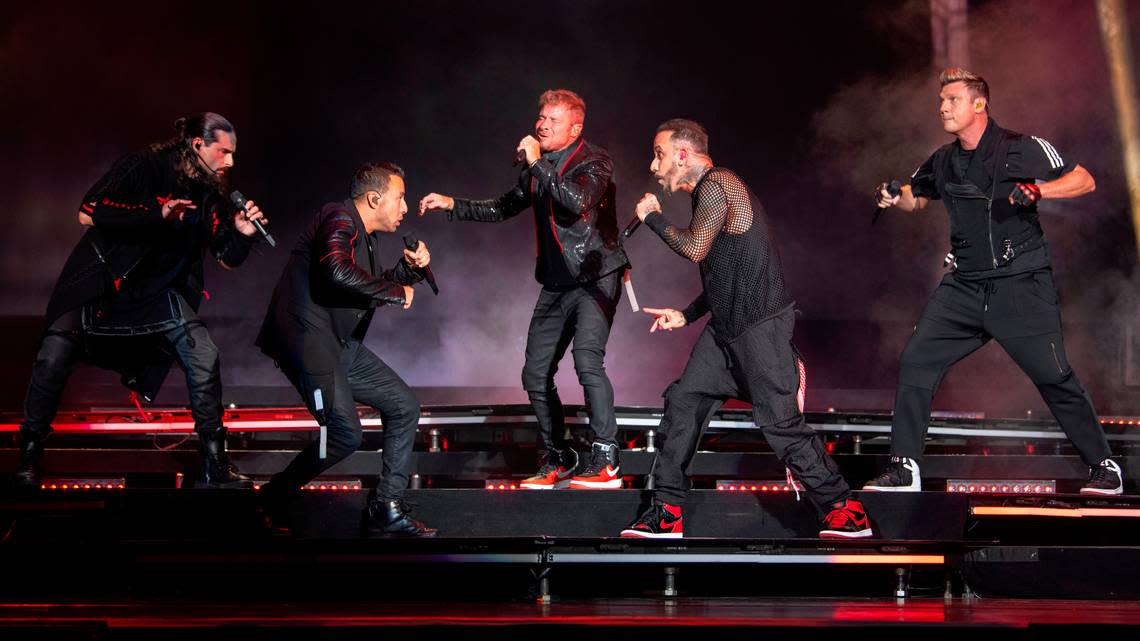With return to Lexington’s Rupp, Backstreet Boys bring pop music career full circle
The time: Memorial Day Weekend, 1999.
The place: The Safeway on Euclid Avenue. I think it was called SuperAmerica back then, but my recall for convenience store names isn’t what it used to be.
Waiting in line with an arm full of edibles for an impending holiday cookout, I glanced over the shoulder of the patron in front of me. He is thumbing through the pages of the then-current issue of Rolling Stone, one that placed the then-unkillable boy band Backstreet Boys on the cover for the first of what would be three times over the next two years. The feature story then comes into view with a banner headline seemingly pulled from the tabloids.
“The Backstreet Boys’ Year in Hell.”
Before I got the chance, the patron let loose with the most obvious and immediate two (well, three, sorta) word reaction anyone, fan or otherwise, would give a heading of such operatic extremes: “Aw, c’mon.”
Rocky road back to Rupp Arena
The headline was the 1999 equivalent of click-bait, of course. After reading the piece (yes, I took the bait and also bought a copy), I could somewhat agree with the sentiment. Outlined were the lengths fans (especially female ones) would go to secure an exclusive audience with the Boys, the megaton lawsuit between the members and Svengali-esque entrepreneur Lou Pearlman (who formed and financed the the group’s rise to stardom) and perhaps, scariest of all, the return of Brian Littrell (one of the Orlando-born quintet’s two Lexington recruits) to full touring duties eight weeks after open heart surgery.
Of course, it’s not like the Backstreet Boys starved during this time. Though income proved to be part of the problem (as well as the catalyst for the lawsuit against Pearlman), there was a level of celebrity status that had skyrocketed over the previous two years thanks to a handful of sugary, pop-centric singles and the mega-platinum sales of the Boys’ first three albums – “Backstreet Boys” (1997), “Backstreet’s Back” (1998) and the then-just released “Millennium” (1999).


Okay, so maybe there was one year in hell and another that wasn’t so bad. After all, by Thanksgiving of 1999, Backstreet Boys – Littrell, cousin and fellow Lexington native Kevin Richardson, AJ McLean, Howie Dorough and Nick Carter – were at Rupp Arena playing a two-night, sold-out engagement.
But here’s the thing. This supposed “year in hell” was over 23 years ago. That translates into more than mere ancient history in pop music terms. It’s instead a collective cave drawing left for future generations to uncover.
Did Backstreet Boys ever really go away?
It would be easy then, to say the excavation of the Backstreet Boys’ pop legacy is now complete, given how the group is returning to Rupp on Sept. 6 for the first time in over two decades (the 1999 shows were followed by a June 2001 performance there). But the past is only part of the appeal. The Boys’ 10th and newest album, 2019’s “DNA,” is its first No. 1 long-player since 2000’s “Black & Blue.”
The cliched response to such a comeback would be to appropriate the title to one of the group’s biggest hits: Backstreet’s Back. But the bottom line is it never went away.
In the 1960s, pop groups that made music for a predominantly teenage audience (especially ones formed in the wake of The Beatles) were built with a limited shelf life. If all went to the correct commercially devised plan, the artist or group in question would fashion a few hits, sell out a concert tour or two and then flame-out as audiences and their musical tastes matured. That made way for a newer age appropriate audience seeking its own batch of pop stars to embrace.
When New Kids on the Block commanded the pop charts beginning in the late ’80s, the appeal of teen pop artists stopped being so temporary. The music wasn’t all that different, but the means of promoting and distributing it certainly shifted. The longer lasting teen act had benefits like music videos, mainstream TV programs like “American Idol” and especially the technological advancements of streaming to key into. The reasons probably extend beyond that. But by the time Backstreet Boys and especially Britney Spears secured stardom in the late ’90s, it was the music industry, not the music itself, that had changed.

Backstreet Boys have definitely experienced ebbs and flows in their appeal following its 1997-2000 heyday, although projects like an extensive 2011-2012 worldwide tour with New Kids on the Block helped maintain and, in some cases, replenish its fanbase.
There also remains a seemingly resilient bond among the group’s five members. Aside from Richardson’s six-year defection from the group (from 2006 to 2012), Backstreet Boys have had no personnel changes during its entire history.
Longevity can be a tricky business in a music market geared toward youth, although the number of pop and rock bands with members in their 60s and 70s is becoming more plentiful. Need we remind anyone that Paul McCartney and Mick Jagger turned 80 and 79, respectively, while on tour this summer. Backstreet Boys haven’t quite hit that milestone yet, although the group’s age range runs from 42 to 50. That means any newly-won teen fans to Backstreet Boys will be serenaded with songs like “I Want It That Way” and “All I Have to Give” at Rupp this go-round by singers that may well be older than their parents.
Next for Backstreet Boys? Christmas album
Not to worry, though. The generations will realign in October when Backstreet Boys issue their first holiday album, “A Very Backstreet Christmas.” Somehow, having the group deliver chestnuts like “White Christmas” and “Winter Wonderland” places an ability to outlast one’s past into keener focus.
“I’m honored to say that I’m a Backstreet Boy,” McLain told CNN in July. “And I’m proud to be a Backstreet Boy in 2022.”
Backstreet Boys with Delta Goodrem
When: Sept. 6 at 7:30 p.m.
Where: Rupp Arena
Tickets: $29.50-$129.50 through ticketmaster.com
